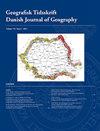以联系为基础的发展的限制:对阿根廷北巴塔哥尼亚石油和天然气部门的评估
IF 0.8
4区 社会学
Q4 ENVIRONMENTAL STUDIES
Geografisk Tidsskrift-Danish Journal of Geography
Pub Date : 2020-11-12
DOI:10.1080/00167223.2020.1847154
引用次数: 1
摘要
该研究报告通过阿根廷巴塔哥尼亚北部的采掘业评估了该地区的发展前景,该地区拥有相当大的非常规油气储量。作者运用全球价值链文献中的关联方法,特别关注向后和向前的生产关联,因为它们可能引发区域经济的结构转型。他发现,北巴塔哥尼亚的公司已经成功地进入了上游行业。政府正在努力促进非常规碳氢化合物集群的发展,甚至希望当地公司冒险进入国外市场,这将使他们成为专业的供应商。但是,它们目前的作用主要限于提供一般产品和服务,而且由于财政和其他限制,这种情况似乎不太可能改变。尽管北巴塔哥尼亚受益于联系,但令人失望的发现促使作者呼吁对全球价值链中基于联系的发展持不那么乐观的看法:资源外围可能停留在通用的低附加值活动水平上。本文章由计算机程序翻译,如有差异,请以英文原文为准。
Limits of linkage-based development: an assessment of the oil and gas sector in North Patagonia, Argentina
ABSTRACT The research note assesses the prospects of development through extractive industries in north Patagonia (Argentina), a region that holds considerably large unconventional oil and gas deposits. The author applies the linkage approach from the literature on global value chains, paying particular attention to backward and forward production linkages because they may trigger a structural transformation of the regional economy. He finds that north Patagonian firms have managed to plug into the upstream sector. There are efforts to facilitate an unconventional hydrocarbon cluster and even hopes of local firms venturing into markets abroad, which would enable them to become specialized suppliers. However, their present role is largely limited to the provision of generic products and services, and it appears unlikely that this will change due to financial and other constraints. Even though north Patagonia benefits from linkages, the disillusioning findings lead the author to call for a less optimistic understanding of linkage-based development in global value chains: resource peripheries may be stuck at a level of generic, low value-added activities.
求助全文
通过发布文献求助,成功后即可免费获取论文全文。
去求助
来源期刊
CiteScore
5.20
自引率
0.00%
发文量
5
期刊介绍:
DJG is an interdisciplinary, international journal that publishes peer reviewed research articles on all aspects of geography. Coverage includes such topics as human geography, physical geography, human-environment interactions, Earth Observation, and Geographical Information Science. DJG also welcomes articles which address geographical perspectives of e.g. environmental studies, development studies, planning, landscape ecology and sustainability science. In addition to full-length papers, DJG publishes research notes. The journal has two annual issues. Authors from all parts of the world working within geography or related fields are invited to publish their research in the journal.

 求助内容:
求助内容: 应助结果提醒方式:
应助结果提醒方式:


